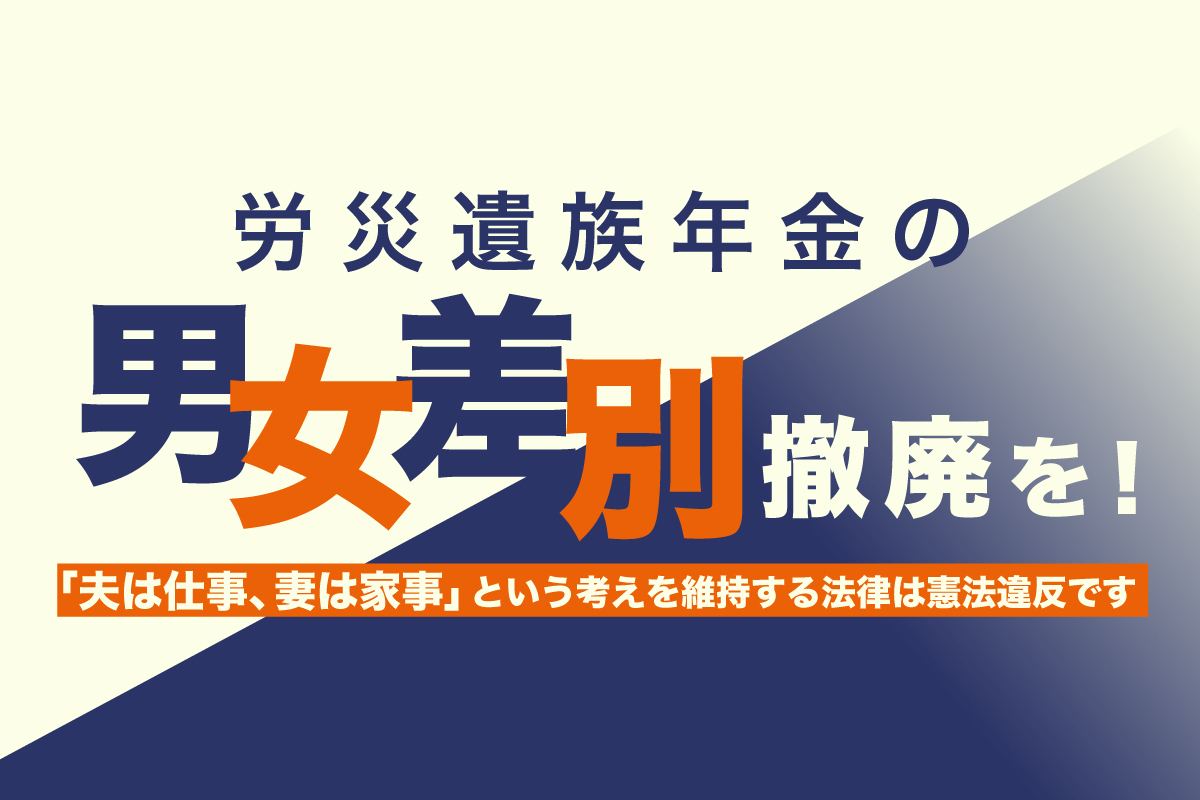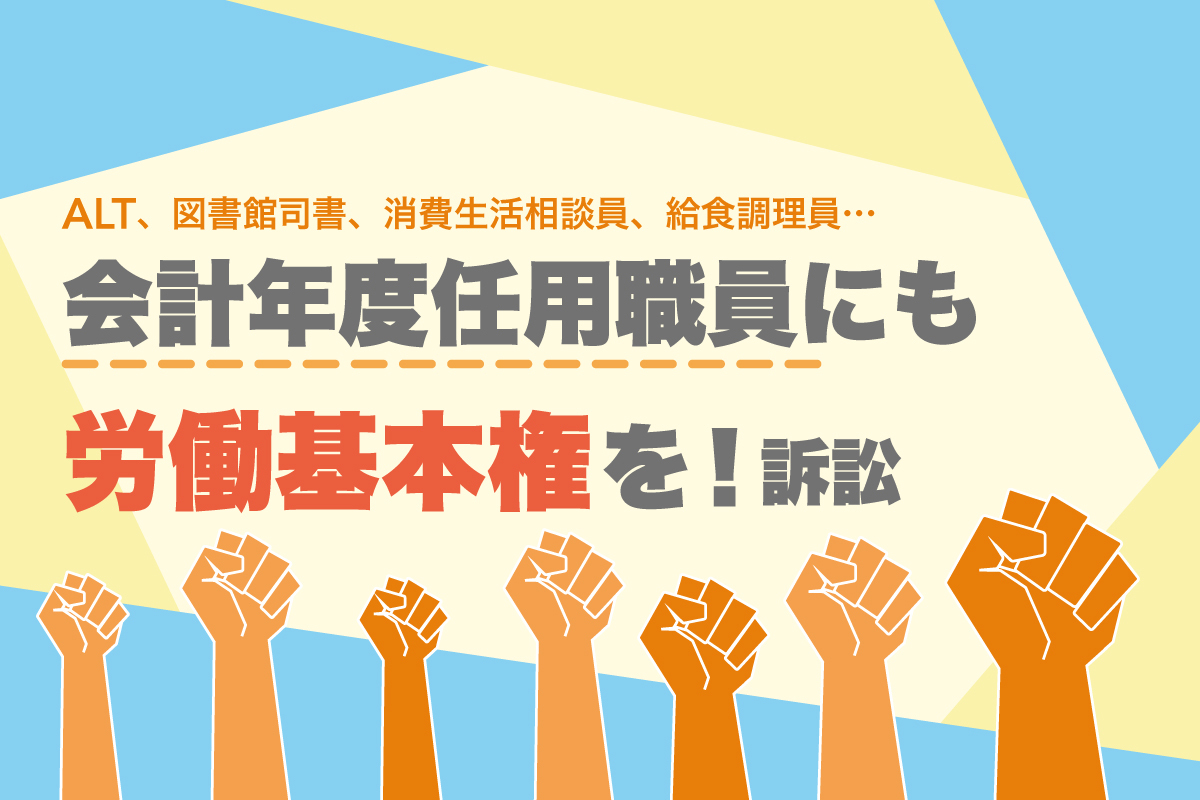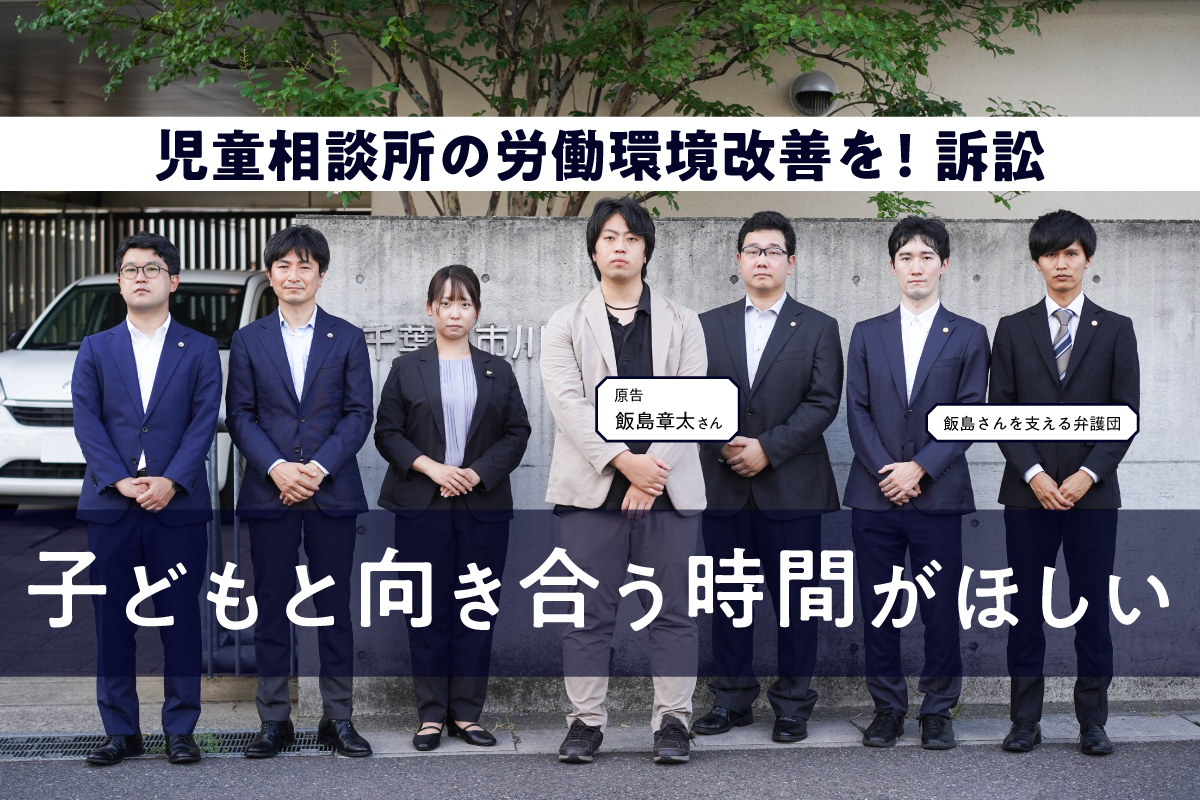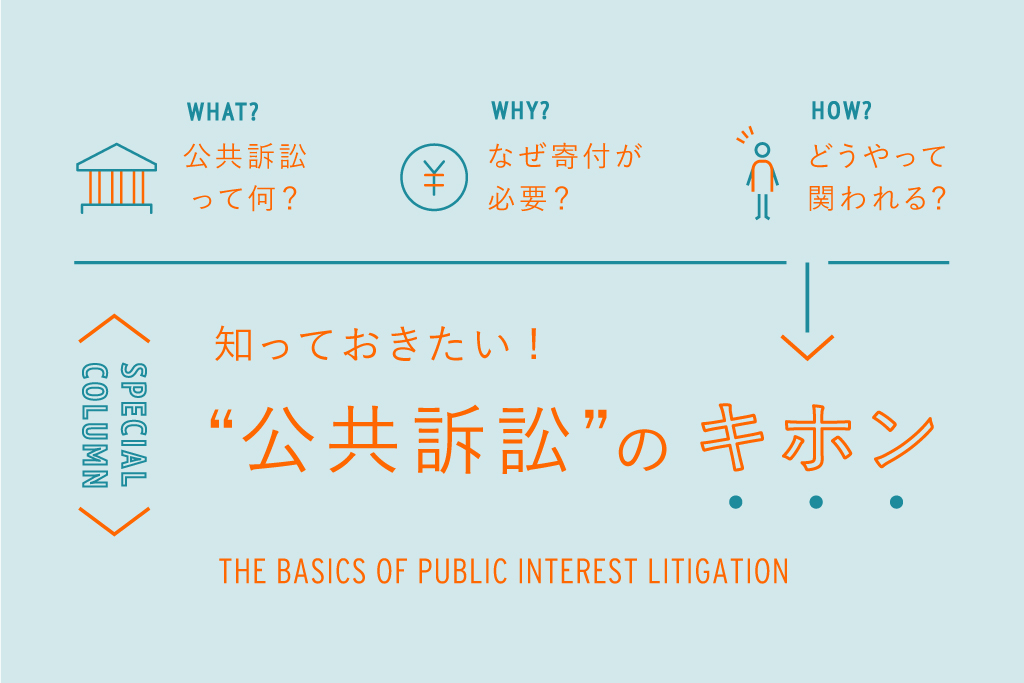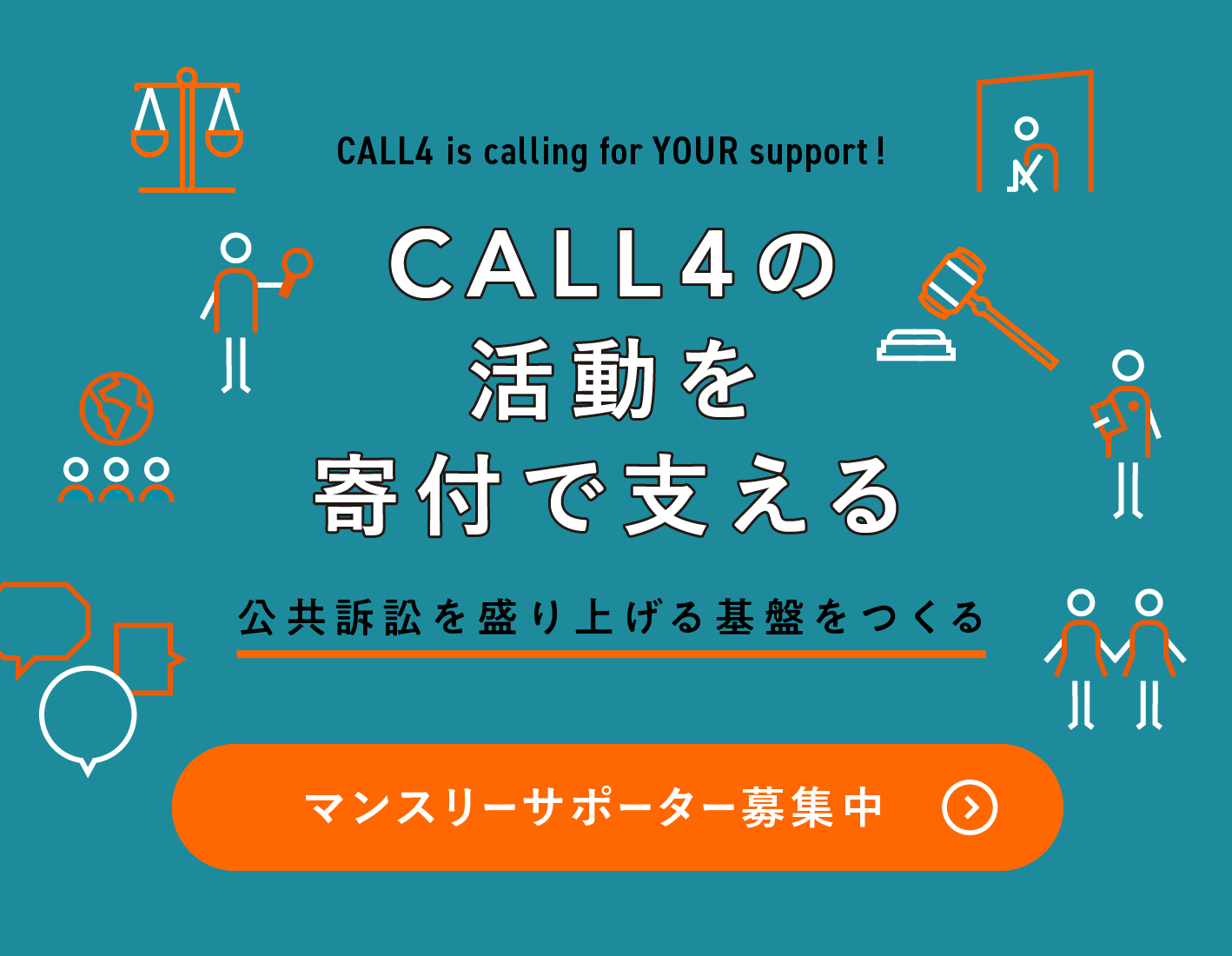家事労働者にも労災認定を!訴訟 Accreditation of workers; compensation for domestic workers! lawsuit
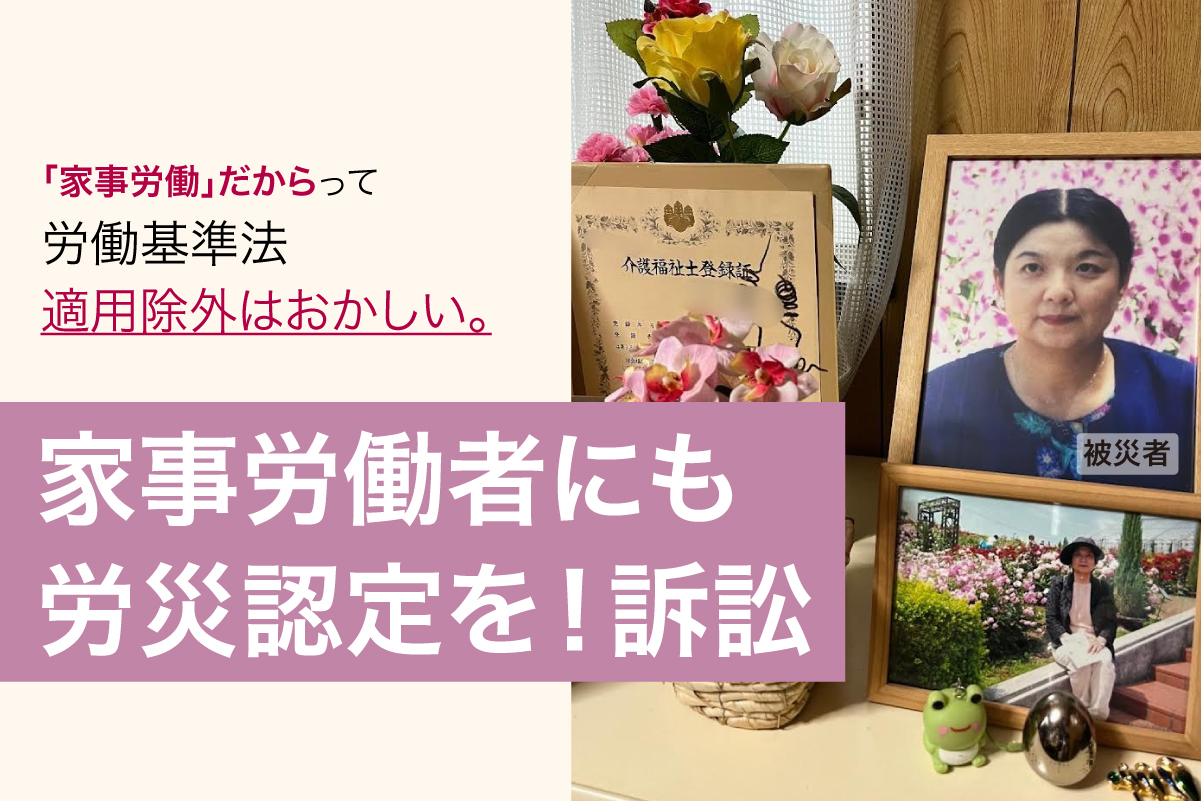
2015年5月、寝たきりの高齢者のお宅で家事業務や介護業務のため、住み込みで1週間ほぼ24時間休みなしで働いていたAさんが亡くなりました。しかし、国は家事労働者には労働基準法が適用されないことを理由に労災を認定しませんでした。
遺族は、家事労働者に労災が認められないのは不当だとして、不認定処分の取り消しを求めて提訴しました。これは、すべての家事労働者の権利回復に関わる裁判です。
In May 2015, Mr. A, who lived in the house of a bedridden elderly person and worked almost 24 hours a day for a week, died. However, the government did not certify workers' compensation on the grounds that the Labor Standards Act does not apply to domestic workers. The bereaved family filed a lawsuit, claiming that it was unfair that domestic workers were not allowed to receive work-related injuries, and sought to have the disapproval disapproved. This is a trial about restoring the rights of all domestic workers.
【経緯】
裁判の対象となっているのは、2015年5月に急性心筋梗塞で亡くなった家事代行及び訪問介護ヘルパーとして働いていた女性のAさん(当時68歳)の死亡に対し、2018年1月に下された国の労災不認定の決定です。
Aさんは株式会社Y社の紹介で、認知症を患う寝たきりの高齢者(要介護度は一番重い「5」)の個人宅にて住み込みで働いていました。常時対応が必要なため、2015年20日~26日までの1週間、ほぼ24時間休みなしで、清掃や洗濯、食事の用意、介護など家事業務と介護業務が渾然一体となった状態で働いていました。
多種多様で専門性も高く責任重大な「ケア労働」を、たった1人で担っていたのです。
「求人票兼労働条件通知書」には休憩時間が深夜0時~5時と記載されており、そもそも24時間中5時間しか休むことが想定されていない契約書となっていました。さらに、Aさんの同僚は「派遣された家政婦は、ろくに睡眠時間も取れない上に、2時間おきのおむつ替え、定期的な失禁にも対応しなければならなかった。事実上24時間労働であり、労働から解放されることがない」旨の証言をしています。そこからも、Aさんがほぼ24時間の過酷な労働を強いられていたことがわかります。
Aさんの死は仕事が原因だと思った遺族は、2017年5月に渋谷労働基準監督署に労災申請をしましたが、2018年1月に不支給決定となりました。その後の異議申し立ての手続きである審査請求、再審査請求も国から退けられました。
その理由は、Aさんが労働基準法116条2項の「家事使用人」に該当し、同法及び労働者災害補償保険法の適用除外となるため、というものでした。遺族は、過重労働が原因で死亡したのに、家事労働者に労災が認められないのは不当だとして、2020年3月に国を相手に東京地裁へ提訴しました。遺族は会見で「家事労働者が労働者として守られないのは重大な人権侵害で納得できない」と訴えました。
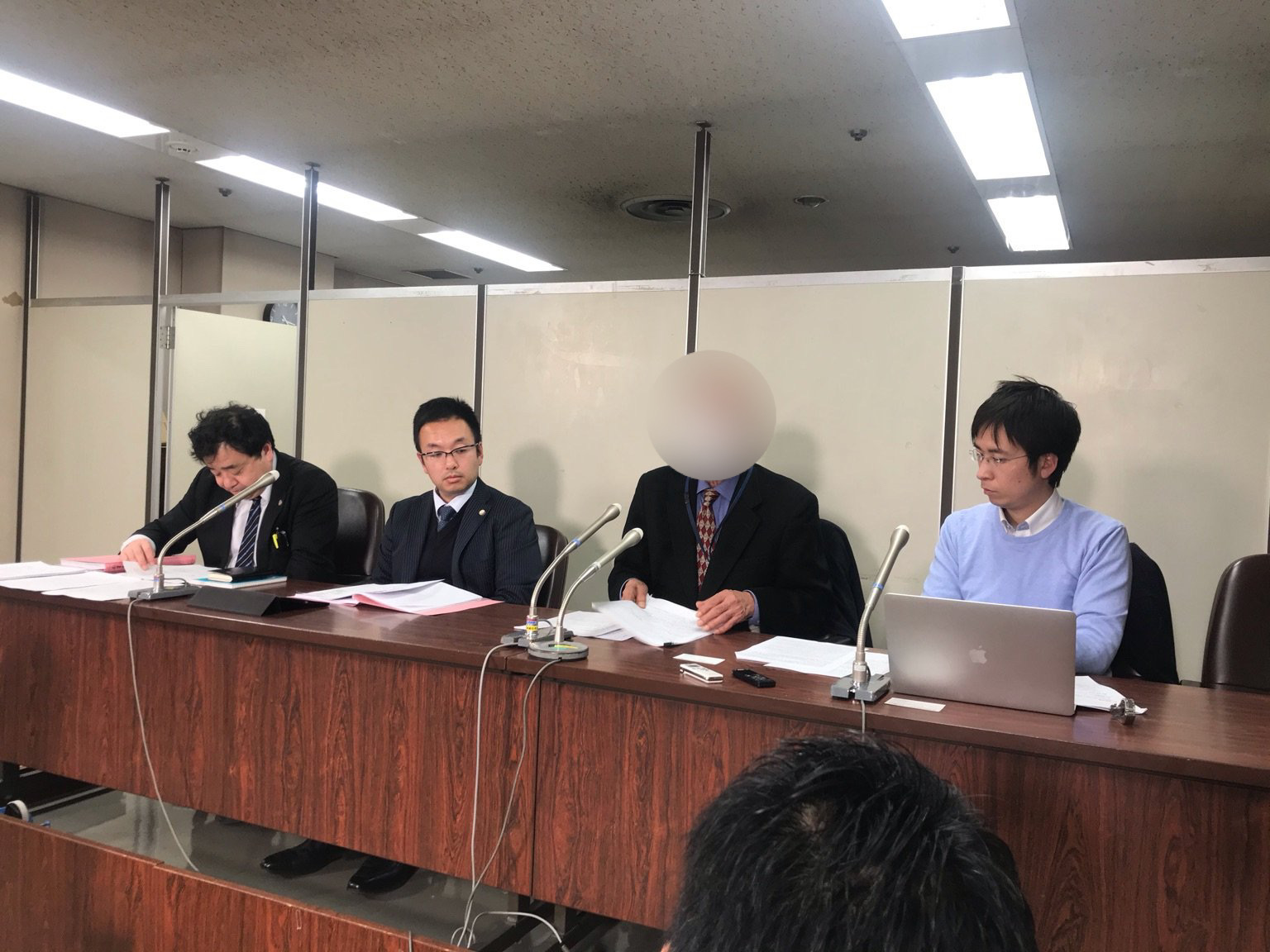
▲提訴時の厚労記者クラブでの会見の模様
【問題の所在】
・家事使用人には労働基準法が適用されない
労基法116条第2項(1947年成立)では、「この法律は、同居の親族のみを使用する事業及び家事使用人については、適用しない」と定めています。個人家庭と直接契約を交わし、指揮命令を受け対価を得て家事一般に従事している場合は「家事使用人」となり、労働基準法や労災保険が適用されません。Aさんが労災認定を受けられなかったのは、国がAさんを「家事使用人」とみなしたためです。
原告の遺族は、過労死が労災認定されれば労災保険から給付されるはずの遺族補償年金等が受け取れませんでした。
・実態を踏まえずに家事使用人に当たると判断
全ての家事労働者が法律上の「家事使用人」になるわけではなく、厚労省通達の基礎第150号(1988年)には、「仲介業者に雇われて、指示を受け働く者は家事使用人に該当しない」としています。「家事使用人」と見なされなければ、労働基準法や労災保険の適用対象の労働者となります。そして、Aさんは表面上の契約書こそ勤務先の個人宅と締結していましたが、労働実態としては個人宅を紹介した仲介会社からの「業務指示書」を受けて働いており、「家事使用人」とはみなせない労働環境でした。
しかし、労働基準監督署は契約書が個人宅とAさんとで締結されていることのみを踏まえて、Aさんを「家事使用人」と判断したのです。この判断はあまりにも実態を踏まえないものです。
・労働基準法116条2項の違憲性
そもそも「家事使用人」の労働基準法等の適用除外規定そのものが不当です。
一つは憲法14条の平等原則に違反するのではないかということです。家事労働が他の労働よりも劣っているということはないですし、法律が家庭に入らないという憲法に書いてないことをもってきて、家事労働者だけ差別するのはおかしいです。
また、憲法27条2項には賃金や就業時間、休息といった勤労条件については法律で定めなさいということが書いてあります。それに基づいて労働基準法や労災保険法ができているのですが、家事使用人だけそのような法律がない状態になっています。合理的な理由があって、どうしても定められないという言うことであればともかく、そうではない以上は、憲法27条2項に違反していると考えられます。
Aさんもそうであるように、家事労働者の多くは女性です。国はこれまで、家事労働者の実態把握等を十分にしておらず、調査等もほとんどありませんが、2015年の国勢調査では、日本国内に約1万1千人の家事労働者(統計上は「家政婦(夫)」)がいるとされ、97%が女性となっています(個人契約の全てを把握できないため、この数字も氷山の一角と予想されます)。家事労働者として働く多くの女性が無権利状態で働いているのです。
・条約の規定との乖離(かいり)
日本とは異なり、国際的には家事労働者の権利は拡大を続けています。2000年代中頃から女性団体や労働組合、NGOなどが連携し家事労働者の国際的な待遇改善を進め、2011年6月、ILO第100回総会で「家事労働者の適切な仕事に関する条約(第189号条約)」が採択されています。この条約では、家事労働者は他の労働者と同じ基本的な労働者の権利を有するべきとして、「安全で健康的な労働環境の権利」、「一般の労働者と等しい労働時間」などが規定されています。
しかし、日本は同条約を未だ批准しておらず、国連女子差別撤廃委員会から勧告も受けていますが、改善の動きは未だありません。
【地裁判決と関心の高まり】
2022年9月29日、東京地裁で判決が出されました。判決はAさんが介護にあたっていた時間である1日4時間30分、1週間で31時間30分を労働時間として認めたものの、それ以外の家事にあたっていた時間は、契約書が個人宅とAさんとで締結されていることのみを踏まえて、家事使用人であるとして労働時間として認めず、請求は不当にも棄却されました。原告は高裁に控訴し、2023年1月24日、控訴審が始まりました。
地裁判決は原告の請求を棄却しましたが、裁判の内容は大きく報じられ、判決に合わせて行われたChange.orgの署名には3万6千筆もの書面が集まり、これらの反響を受け加藤厚労大臣は家事労働者の実態調査を行い、制度を変える方向で検討を進めると明言しています。
【訴訟を通して実現したいこと】
Aさんの労災認定を実現するとともに、労働基準法や労災保険法の適用除外という労働者としての最も基本的な権利すら認められていない家事労働者の現状に多くの人が目を向け、こうした差別的な状況を問題と捉えられるようにしたいと考えています。
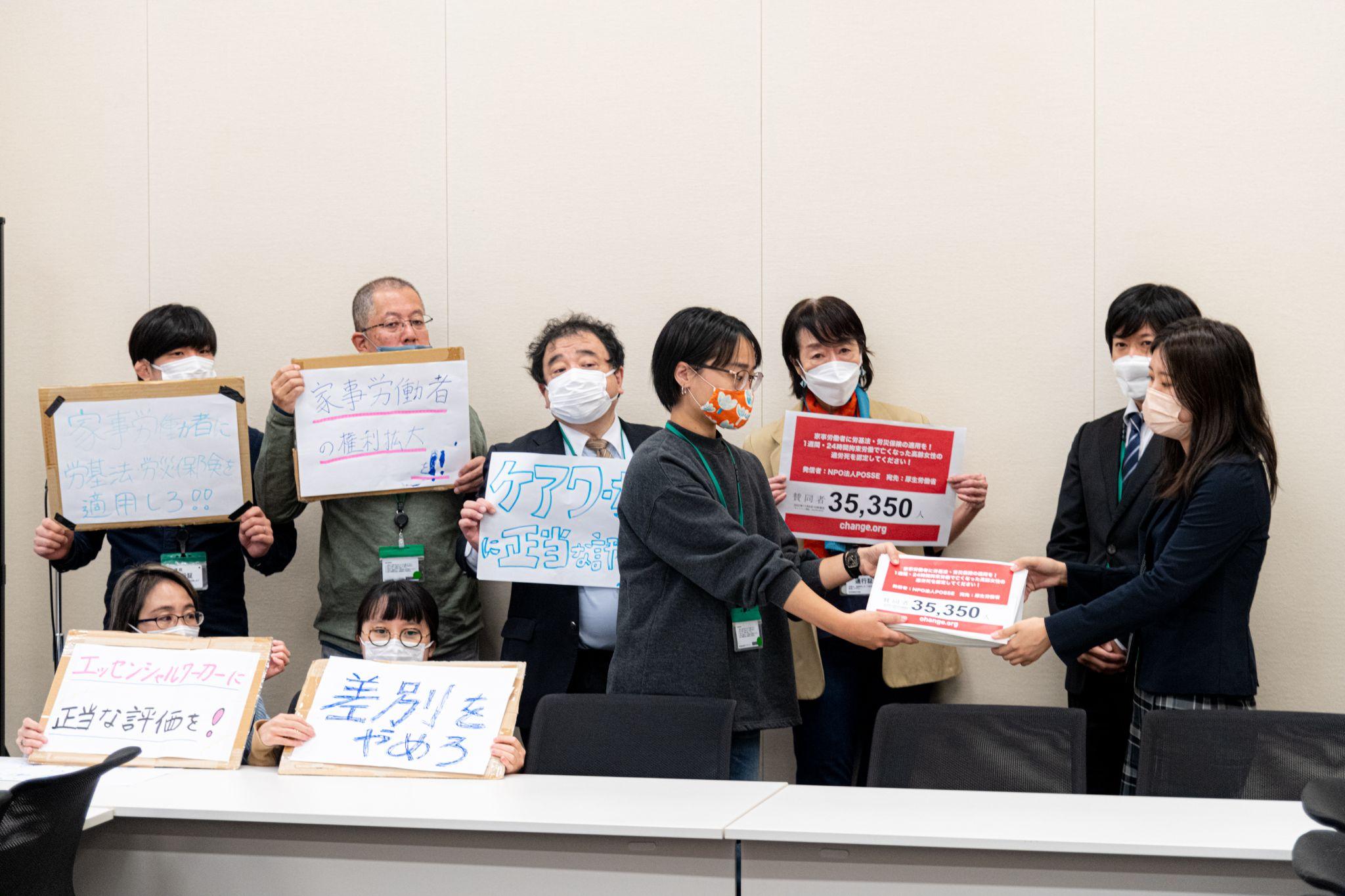
▲2022年11月9日、3万5000筆を超えるオンライン署名を厚生労働省に手渡しました(写真:change.org提供)
【寄付金の使途】
① 訴訟提起のための必要経費(印紙・郵便切手等)
② 証人等の交通費
③ 意見書費用
④ 弁護士費用
⑤ その他(訴訟に関連するもの)
⑥ お金が余った場合には家事労働者の権利擁護の活動のために使わせていただきます。
すでにAさんの過労死に対する労災の不支給決定から4年以上の歳月が経ってしまいました。原告は「すべての家事労働者、女性労働者のためにこの裁判を闘う。そのことを亡くなったAさんも喜んでくれているはず」、といつも話しています。
社会的に意義の大きいこの裁判闘争にみなさまのご支援を宜しくお願い致します。
【担当弁護士のメッセージ】
明石 順平 弁護士
この事件の背景には何十年も放置され、無視され続けてきた女性差別があります。今度こそ、その差別に終止符を打ちたいと思います。
指宿 昭一 弁護士
「家事使用人だから労災認定はしない。」21世紀の日本で、こんな差別がまかり通っています。どう考えても、おかしなことです。被災者に労働法を適用させ、また、すべての家事労働者の権利を回復するために闘います。
【担当弁護士】
指宿昭一(第二東京弁護士会・暁法律事務所)
明石順平(埼玉弁護士会・鳳法律事務所)
【裁判支援】
この裁判は、労働問題・貧困問題に取り組むNPO法人POSSEへ遺族に相談したところから始まりました。POSSEは傍聴支援を行うとともに、Change.orgのオンラインキャンペーンなどを展開しています。ボランティアも募集しております。
|
change.org署名「家事労働者に労基法・労災保険の適用を! 1週間・24時間拘束労働で亡くなった高齢女性の過労死を認定してください!」 |
【background】
The subject of the lawsuit is the death of Ms. A (68 years old at the time), who worked as a housekeeper and visiting care helper, who died of an acute myocardial infarction in May 2015. This is the country's decision not to recognize the accident as a work-related accident.
Mr. A was introduced by Company Y Co., Ltd. and was working as a live-in worker at the private home of a bedridden elderly person suffering from dementia (with the highest level of care required, ``5''). Because constant support is required, I worked almost 24 hours a day from the 20th to the 26th of 2015, combining housework and nursing care duties such as cleaning, laundry, meal preparation, and nursing care. I was there.
Only one person was responsible for the diverse, highly specialized, and highly responsible ``care work.''
The "job offer form and notice of working conditions" states that the break time is from 12:00 a.m. to 5:00 a.m., and in the first place, the contract was written in such a way that it was assumed that the employee would only take 5 hours off out of 24 hours. In addition, Mr. A's colleague said, ``The dispatched housekeepers didn't get much sleep, and they had to change diapers every two hours and deal with regular incontinence.In effect, they worked 24 hours a day. "There is no relief from labor," he testified. From there, we can see that Mr. A was forced to work almost 24 hours a day.
Believing that Mr. A's death was caused by his work, the bereaved family filed a work-related accident claim with the Shibuya Labor Standards Inspection Office in May 2017, but in January 2018 it was decided not to provide benefits. Subsequent objection procedures, such as a request for review and a request for reexamination, were also rejected by the government.
The reason for this was that Mr. A falls under the category of "domestic servant" under Article 116, Paragraph 2 of the Labor Standards Act, and is exempt from the application of that law and the Workers' Accident Compensation Insurance Act. In March 2020, the family filed a lawsuit against the government in the Tokyo District Court, arguing that it was unfair for domestic workers to not be recognized as workers' compensation claims, even though the death was caused by overwork. At the press conference, the family complained, ``It is a serious violation of human rights that domestic workers are not protected as workers, and we cannot accept that.''

▲ Press conference at the Health, Labor and Welfare Press Club when the lawsuit was filed
[Where the problem lies]
・The Labor Standards Act does not apply to domestic servants.
Article 116, Paragraph 2 of the Labor Standards Act (enacted in 1947) states that ``This law does not apply to businesses that employ only relatives who live together and to domestic workers.'' Sign a contract directly with a private family, receive instructions and receive compensation, and engage in general housework. If they are, they are considered "domestic servants" and are not covered by the Labor Standards Act or workers' compensation insurance. The reason Mr. A could not receive recognition for workers' compensation was because the government deemed Mr. A to be a "domestic servant."
The plaintiff's surviving family did not receive the survivor's compensation pension, etc. that would have been paid through workers' compensation insurance if the death from overwork was recognized as a work-related accident.
・Judging that the person is a domestic servant without considering the actual situation
Not all domestic workers are legal "domestic servants"; Ministry of Health, Labor and Welfare Circular No. 150 (1988) states that "those who are employed by an intermediary and work under the direction of "They do not fall under the category of domestic servants." If they are not considered "domestic servants," they will be covered by the Labor Standards Act and workers' compensation insurance. On the surface, Mr. A signed a contract with the private home where he worked, but in reality, he was working based on a "work instruction" from the intermediary company that introduced him to the private home. The working environment was such that they could not be considered "domestic servants."
However, the Labor Standards Inspection Office determined that Mr. A was a ``household employee'' based solely on the fact that the contract was concluded between Mr. A and a private residence. This judgment does not take into account the reality.
・Unconstitutionality of Article 116, Paragraph 2 of the Labor Standards Act
In the first place, the exemption provisions of the Labor Standards Act for "domestic servants" are themselves unfair.
One is that it may violate the principle of equality in Article 14 of the Constitution. Domestic work is not inferior to other types of work, and it is strange to discriminate only against domestic workers by bringing in something that is not written in the constitution, which prohibits domestic workers from entering the home.
Furthermore, Article 27, Paragraph 2 of the Constitution states that working conditions such as wages, working hours, and rest should be determined by law. Based on this, the Labor Standards Act and Worker's Accident Accident Insurance Act have been established, but there is no such law for domestic servants. It doesn't matter if there is a rational reason why it cannot be established, but as long as it is not so, it is considered to be a violation of Article 27, Paragraph 2 of the Constitution.
Most domestic workers are women, as is Ms. A. Until now, the government has not fully grasped the actual situation of domestic workers, and there have been few surveys, but according to the 2015 census, there were approximately 11,000 domestic workers in Japan (statistically, 97% of them are women (this figure is expected to be just the tip of the iceberg, as it is not possible to track all individual contracts). Many women who work as domestic workers do so without rights.
・Difference from the provisions of the treaty
Unlike in Japan, domestic workers' rights continue to expand internationally. Since the mid-2000s, women's organizations, trade unions, NGOs, and other organizations have been working together to improve the international treatment of domestic workers. Convention No. 189) has been adopted. This convention stipulates that domestic workers should have the same basic labor rights as other workers, including the ``right to a safe and healthy working environment'' and ``equal working hours as other workers.'' stipulated.
However, Japan has not yet ratified the Convention, and although it has received recommendations from the United Nations Committee on the Elimination of All Forms of Discrimination against Women, there has been no movement toward improvement.
[District court ruling and growing interest]
The judgment was issued at the Tokyo District Court on September 29, 2022. Although the judgment recognized Mr. A's 4 hours and 30 minutes a day and 31 hours and 30 minutes a week as working hours, the time spent caring for Mr. Based solely on the fact that the employee was a domestic employee, the employee's hours were not recognized as working hours, and the claim was unfairly dismissed. The plaintiff appealed to the High Court, and the appeal hearing began on January 24, 2023.
Although the district court's judgment dismissed the plaintiff's claim, the contents of the case were widely reported, and a Change.org petition created in conjunction with the judgment gathered 36,000 signatures, and in response to these responses, Kato The Minister of Health, Labor and Welfare has stated that he will conduct a survey of the actual situation of domestic workers and consider ways to change the system.
[What we want to achieve through litigation]
In addition to realizing Mr. A's work-related compensation certification, many people have turned their attention to the current situation of domestic workers, who are denied even the most basic rights as workers, such as being exempted from the Labor Standards Act and the Worker's Accident Compensation Insurance Act. We want to be able to see discriminatory situations as a problem.

▲On November 9, 2022, we handed over 35,000 online signatures to the Ministry of Health, Labor and Welfare (Photo: provided by change.org )
[Usage of donations]
① Necessary expenses for filing a lawsuit (stamps, postage stamps, etc.)
② Transportation expenses for witnesses, etc. ③ Written opinion expenses ④ Attorney fees ⑤ Other (related to litigation)
⑥ If there is any leftover money, it will be used for activities to protect the rights of domestic workers.
More than four years have already passed since the decision was made not to provide workers' compensation benefits for Mr. A's death from overwork. The plaintiff always says, ``I will fight this lawsuit on behalf of all domestic workers and female workers. I'm sure the deceased Ms. A would be happy about this.''
We appreciate your support in this court battle, which has great social significance.
[Message from the lawyer in charge]
Junpei Akashi Attorney
Behind this incident is discrimination against women that has been ignored and ignored for decades. This time, I would like to put an end to that discrimination.
Shoichi Ibusuki Attorney
``Because I am a domestic servant, I will not be certified as a worker's compensation worker.'' In 21st century Japan, this kind of discrimination is common. No matter how you think about it, it's strange. We will fight to enforce labor laws for disaster victims and restore the rights of all domestic workers.
[Attorney in charge]
Shoichi Ibusuki (Daini Tokyo Bar Association/Akatsuki Law Office)
Junpei Akashi (Saitama Bar Association/Otori Law Office)
[Trial support]
The trial began when the bereaved family consulted with POSSE, an NPO that works on labor and poverty issues. In addition to providing listening support, POSSE is also running an online campaign on Change.org. We are also looking for volunteers .
|
change.org署名「家事労働者に労基法・労災保険の適用を! 1週間・24時間拘束労働で亡くなった高齢女性の過労死を認定してください!」 |
あなたにおすすめのケース Recommended case for you
- 外国にルーツを持つ人々 Immigrants/Refugees/Foreign residents in Japan
- ジェンダー・セクシュアリティ Gender/Sexuality
- 医療・福祉・障がい Healthcare/Welfare/Disability
- 働き方 Labor Rights
- 刑事司法 Criminal Justice
- 公正な手続 Procedural Justice
- 情報公開 Information Disclosure
- 政治参加・表現の自由 Democracy/Freedom of Expression
- 環境・災害 Environment/Natural Disasters
- 沖縄 Okinawa
- 個人情報・プライバシー Personal information/Privacy
- アーカイブ Archive
- 全てのケース ALL
